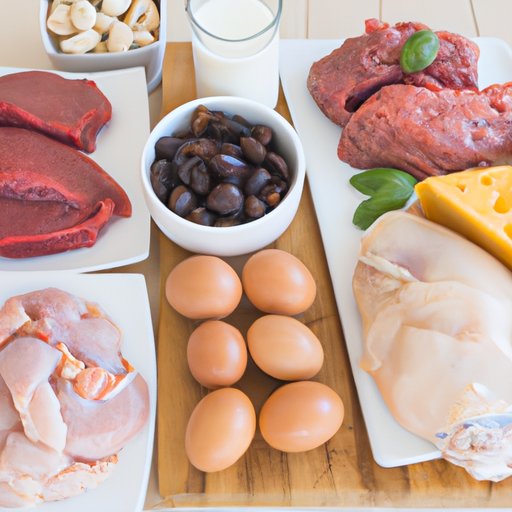
Introduction
If you’re looking to lose weight, you may have stumbled upon the idea of incorporating more protein into your diet. High-protein diets have become increasingly popular for weight loss, but are they truly effective or just another fad diet? In this article, we will explore the science behind high-protein diets and how they can aid in weight loss. We will also provide practical tips, pros and cons, and myth-busting information to help you determine if a high-protein diet is right for you.
We will explore the importance of finding a sustainable and balanced approach to weight loss that works for your unique needs and preferences. Let’s dive in!
The Benefits of a High-Protein Diet for Weight Loss: Exploring the Science Behind It
Protein is an essential macronutrient that is critical for building and repairing tissues, hormones, and enzymes in the body. But protein can also play a crucial role in weight loss. Unlike carbohydrates and fats, protein takes longer to digest, which can help you feel fuller for longer and reduce your overall calorie intake by preventing overeating.
In addition, consuming a high-protein diet can boost your metabolism and increase the number of calories you burn at rest. This process is known as the thermic effect of food, where your body uses more energy to digest and process the protein you consume.
Research has also suggested that a high-protein diet may help preserve muscle mass during weight loss, reduce cravings, and minimize the risk of weight regain.
How to Optimize High-Protein Foods for Weight Loss: A Comprehensive Guide
When it comes to incorporating high-protein foods into your diet, it’s essential to choose lean sources of protein and pair them with other healthy foods to create balanced meals. Some examples of healthy high-protein foods include chicken breast, fish, turkey, tofu, beans, lentils, nuts, and seeds.
Here are some tips to optimize high-protein foods for weight loss:
- Choose lean protein sources that are low in saturated fats and calories
- Incorporate high-protein snacks such as boiled eggs, Greek yogurt, or protein smoothies
- Pair protein with fiber-rich foods such as vegetables, whole grains, and fruits to increase satiety and promote healthy digestion
- Limit processed and high-sugar protein sources such as deli meats, sausage, and protein bars that can be high in calories and additives
By creating balanced meals with lean protein sources, fiber-rich foods, and healthy fats, you can optimize protein for effective weight loss.
Pros and Cons of High-Protein Diets for Effective Weight Loss Management
While high-protein diets can provide numerous benefits for weight loss, there are also potential drawbacks to consider.
Pros of high-protein diets for weight loss include:
- Reduced calorie intake
- Increase in metabolism
- Preservation of muscle mass
- Reduced hunger and cravings
- Promotion of healthy eating habits
Cons of high-protein diets for weight loss include:
- Risk of kidney damage or other health concerns for those with pre-existing kidney issues
- Potential nutrient deficiencies if not balanced with other essential nutrients
- Possible weight gain if high-protein foods are high in calories and not balanced with other healthy foods
While there are potential drawbacks, many scientific studies have supported the safety and effectiveness of high-protein diets for weight loss when followed correctly, under the guidance of a healthcare professional.
High-Protein Meal Plan for Effective and Sustainable Weight Loss: A Simple Guide
Here is a sample high-protein meal plan for effective weight loss:
- Breakfast: Greek yogurt with mixed berries and almonds
- Snack: Hard-boiled egg with apple slices
- Lunch: Grilled chicken breast with roasted vegetables and quinoa
- Snack: Protein shake with unsweetened almond milk, banana, and peanut butter
- Dinner: Baked salmon with asparagus and sweet potato
It’s important to note that the above meal plan is a sample and can be adjusted according to individual preferences and dietary needs. The key is to incorporate lean protein sources, fiber-rich foods, and healthy fats for balanced meals.
In addition to creating a high-protein meal plan, it’s also essential to sustain healthy eating habits in the long term. This includes finding a balanced approach to eating that includes a variety of nutrient-dense foods, staying hydrated, and incorporating physical activity into your routine.
Exposing Myths and Misconceptions about High-Protein Diets and Weight Loss
There are many myths and misconceptions surrounding high-protein diets and weight loss, which can make it challenging to navigate what’s fact or fiction. Here are some common myths debunked:
- Myth: All protein is equal: Not all protein sources are created equal. It’s crucial to choose lean sources of protein that are low in calories and saturated fats.
- Myth: Protein alone causes weight loss: While protein can aid in weight loss, it’s not a magic bullet. It’s crucial to incorporate other healthy foods and engage in physical activity for effective weight loss.
- Myth: High-protein diets cause kidney damage: While high-protein diets can be harmful to those with pre-existing kidney issues, there is no evidence to suggest that high-protein diets cause kidney damage in healthy individuals.
It’s important to consult with a healthcare professional and separate fact from fiction when it comes to high-protein diets and weight loss.
Conclusion
High-protein diets can provide numerous benefits for weight loss, such as increased metabolism, preserved muscle mass, and reduced hunger and cravings. However, it’s essential to balance protein with other essential nutrients, incorporate physical activity, and find a sustainable and practical approach to eating for long-term weight loss results.
By following evidence-based tips, debunking myths, and seeking guidance from a healthcare professional, you can determine if a high-protein diet is right for you and create a personalized plan for achieving your weight loss goals.




